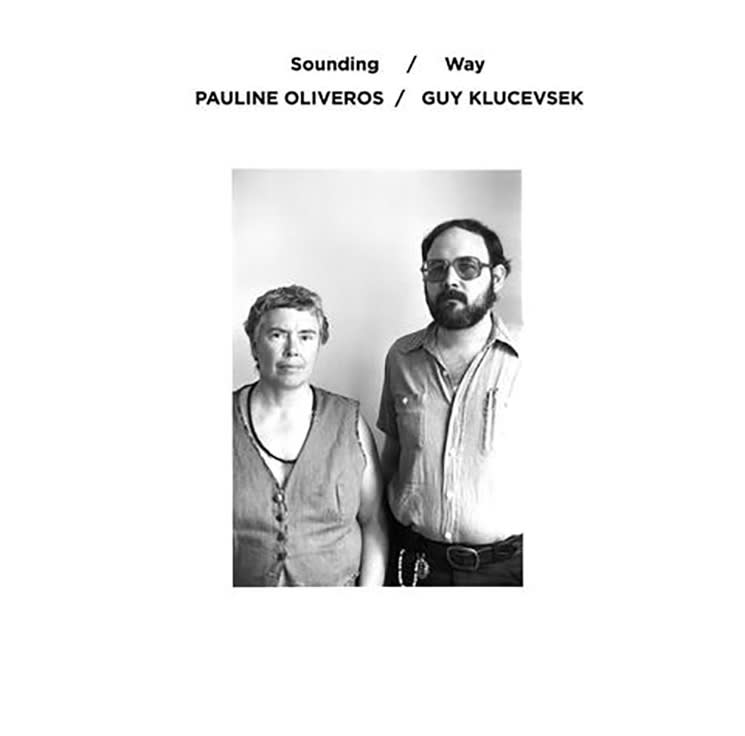Originally released on cassette and out of print since, a vinyl reissue of this 1986 collaboration between experimental accordionists Pauline Oliveros and Guy Klucevsek comes as part of an ongoing effort between Important Records and the Pauline Oliveros Trust to further the legacy of the late pioneer.
Consisting of two side-long compositions written for two accordions, each providing a composition to perform alongside the other, fans of Oliveros's career will be immediately compelled toward "The Tuning Meditation" side of the record. This recording has a life better established outside of this release, as Oliveros was known to present it in live appearances as a vocal "deep listening" exercise, often relying on the audiences surrounding her to bring the music to life.
In these cases, Oliveros gave instructions to her audiences first to do nothing more than listen to their surroundings, with someone eventually singing the tone they perceive within the environment on a single comfortable breath, joined by their fellow listeners doing the same, but incorporating the new voice(s). As breaths are exhausted, listeners are then meant to select voices distant from them and tune their voices to them.
As the exercise continues, participants are meant to alternate between reflecting fellow listeners and contributing new tones they perceive no one else to be singing, and accordingly oscillate, as MacArthur Fellow artist and writer Josiah McElheny has observed, between these "states of listening for as long as it seems right."
Presumably operating with similar instructions, this iteration of the work opens with a few seconds of stillness before a sharp accordion note pierces the atmosphere, shortly answered by a twin. The action continues as expected, eventually adopting the character of some wonky church organ, but the key difference from the vocal version fans will be more familiar with is its heightened physicality. Rather than summoning responses from within themselves, here, the performers are tasked with conveying them through the instruments in their hands — finding the correct notes on their keyboards while managing the air in their bellows.
Klucevsek's contribution to the release is his "Tremolo No 6 (Nucleic Chains)," a pulsing work of intense minimalism that rallies the simple ingredients of two trembling accordions into a swarming crescendo through extended repetition, Oliveros and Klucevsek's duelling performances inevitably slipping out of phase and establishing the spectre of a third, "secret" presence in between.
The combined import of these two compositions is staggering. While one emphasizes the creative potential of harmony, the other reveals the potential velocity of dialectical engagement.
In her work, Oliveros emphasized the healing capacity of listening, and through rendezvousing with Klucevsek, the pair illustrated its generative force. This is a document of two artists in active dialogue — with themselves, each other, and the world around them. Perhaps having it available to a new generation could stir a restorative revolution.
(Important)Consisting of two side-long compositions written for two accordions, each providing a composition to perform alongside the other, fans of Oliveros's career will be immediately compelled toward "The Tuning Meditation" side of the record. This recording has a life better established outside of this release, as Oliveros was known to present it in live appearances as a vocal "deep listening" exercise, often relying on the audiences surrounding her to bring the music to life.
In these cases, Oliveros gave instructions to her audiences first to do nothing more than listen to their surroundings, with someone eventually singing the tone they perceive within the environment on a single comfortable breath, joined by their fellow listeners doing the same, but incorporating the new voice(s). As breaths are exhausted, listeners are then meant to select voices distant from them and tune their voices to them.
As the exercise continues, participants are meant to alternate between reflecting fellow listeners and contributing new tones they perceive no one else to be singing, and accordingly oscillate, as MacArthur Fellow artist and writer Josiah McElheny has observed, between these "states of listening for as long as it seems right."
Presumably operating with similar instructions, this iteration of the work opens with a few seconds of stillness before a sharp accordion note pierces the atmosphere, shortly answered by a twin. The action continues as expected, eventually adopting the character of some wonky church organ, but the key difference from the vocal version fans will be more familiar with is its heightened physicality. Rather than summoning responses from within themselves, here, the performers are tasked with conveying them through the instruments in their hands — finding the correct notes on their keyboards while managing the air in their bellows.
Klucevsek's contribution to the release is his "Tremolo No 6 (Nucleic Chains)," a pulsing work of intense minimalism that rallies the simple ingredients of two trembling accordions into a swarming crescendo through extended repetition, Oliveros and Klucevsek's duelling performances inevitably slipping out of phase and establishing the spectre of a third, "secret" presence in between.
The combined import of these two compositions is staggering. While one emphasizes the creative potential of harmony, the other reveals the potential velocity of dialectical engagement.
In her work, Oliveros emphasized the healing capacity of listening, and through rendezvousing with Klucevsek, the pair illustrated its generative force. This is a document of two artists in active dialogue — with themselves, each other, and the world around them. Perhaps having it available to a new generation could stir a restorative revolution.
